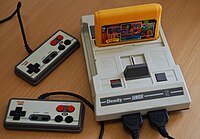Dendy (console)
 |
|
 |
|
| Manufacturer | Steepler |
|---|---|
| Type | Video game console |
| Retail availability |
|
| Discontinued | 1996 |
| Units sold | 1.5 million – 2 million |
| Media | ROM cartridge |
| CPU | MOS Technology 6502 |
Dendy (Russian: Де́нди) is a Taiwanese hardware clone of the Family Computer (the Japanese version of the Nintendo Entertainment System), produced for the Russian market. It was released in the early 1990s by the Steepler company. Since no officially licensed version of the NES was ever released in the former USSR, the Dendy was easily the most popular video game console of its time in that region and enjoyed a degree of fame roughly equivalent to that experienced by the NES/Famicom in North America and Japan. In 1992, Dendy was selling in Russia for 39000 rubles (roughly 70–80 USD); by 1994, over one million Dendy units were sold in Russia, and the price was roughly $35.
The Dendy first appeared on the market in late 1992, selling at the price of 39,000 rubles ($94). The console had its own animated Russian television advertisement with the phrase "Dendy, Dendy! We all love Dendy! Dendy – everyone play!" Later shifted to the phrasing "Dendy - the new reality". Demand for the console was very high, bringing attention to the console. By April 1993, Steepler had four regional distributors and had generated 500 million rubles in revenue.
The Dendy elephant logo was designed by Russian animator Ivan Maximov.
Though Steepler quickly filled a nearly empty niche, the Western gaming market still was not interested in Russia at the time. For a while, the Dendy's main competitors were similar products from China. It was not until 1994 that a competitor, the Sega console produced by Nisho Iwai and Forrus, was introduced to the market.
Steepler reorganized in early 1994, resulting in the separation and creation of the Lamport company, which later manufactured the Kenga, another SNES Clone
...
Wikipedia
